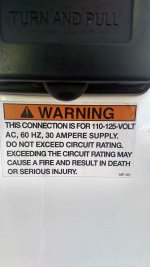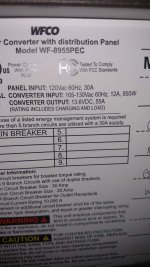Bones
Well-known member
You know I think we may have accidentally confused the OP even more. Here are a few articles I found.
RV Electrical
RV forum
Can I hook up 30 amps to a 50 amp plug
The general consensus is that you can plug a lower amperage device into a higher amperage plug. Your rig is going to pull only what it can pull. It was designed to pull 30 amps so that is what it is going to pull. Your cord was designed for your 30 amp rig so that is what it is going to hold.
A company sells dog bones. CAMCO here is the specific one you are asking about. 50amp to 30amp
Although I know what the one person on here is saying about the power cord possibly frying due to a short. I have this to say. If you have a short in your main supply wire wither it be a 50 amp supply or a 30 amp supply, no mater what current breaker you are plugged into is going to be a bad situation no matter and cause a significant amount of damage.
RV Electrical
RV forum
Can I hook up 30 amps to a 50 amp plug
The general consensus is that you can plug a lower amperage device into a higher amperage plug. Your rig is going to pull only what it can pull. It was designed to pull 30 amps so that is what it is going to pull. Your cord was designed for your 30 amp rig so that is what it is going to hold.
A company sells dog bones. CAMCO here is the specific one you are asking about. 50amp to 30amp
Although I know what the one person on here is saying about the power cord possibly frying due to a short. I have this to say. If you have a short in your main supply wire wither it be a 50 amp supply or a 30 amp supply, no mater what current breaker you are plugged into is going to be a bad situation no matter and cause a significant amount of damage.
Last edited:


